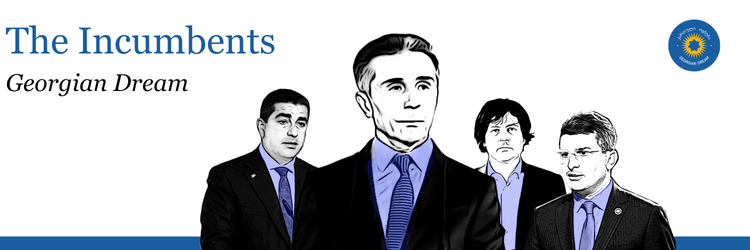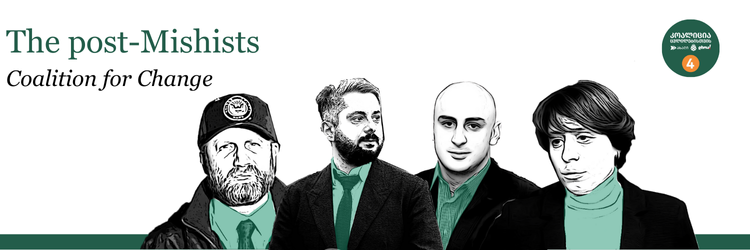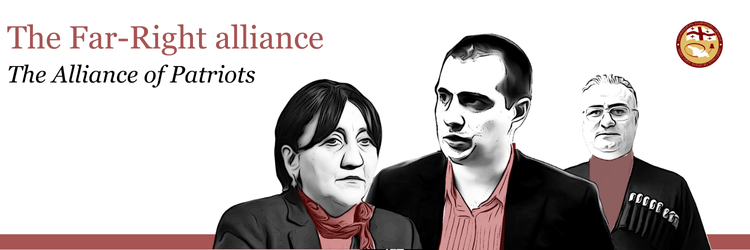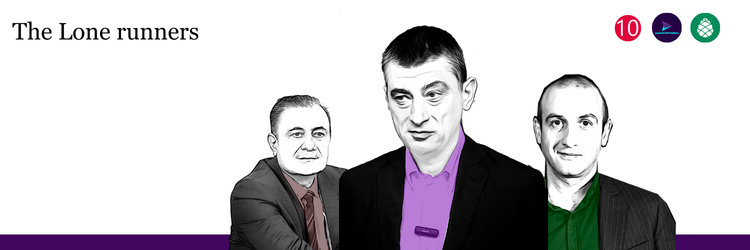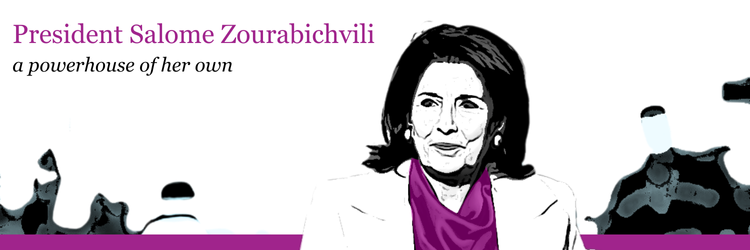

Georgians will go to the polls on 26 October in crucial parliamentary elections.
Unlike in previous years, this election will be held under a fully proportional system. This means parties will be allocated a percentage of parliament’s 150 seats based entirely on the percentage of votes they receive nationwide, doing away with elections for individual MPs in single-seat constituencies.
However, despite calls from many smaller parties, and despite previously promising the opposite, the ruling Georgian Dream party have instituted a threshold of 5% of the vote for parties to be allocated any seats.
The threat of falling below this threshold (only Georgian Dream and the UNM won more than 5% of the vote in 2020) has led to a consolidation of many opposition parties around several groupings.
Georgian Dream, headed by its billionaire founder Bidzina Ivanishvili, deposed the United National Movement (UNM) in 2012 and have since gone undefeated in national elections, including the October 2020 parliamentary election, where they secured a third term in power.
Their namesake coalition, a mix of social liberals and conservatives, was largely disbanded prior to the 2016 parliamentary election.
However, this is the first time the ruling party is vying for a mandate to lead the nation with a strong authoritarian agenda, one that is at odds with the desire of Georgians to strengthen ties with the EU and NATO.
Strengths: Incumbency advantage, Ivanishvili’s financial resources, administrative resources under the government’s control.
Weaknesses: A strong anti-Western turn that may alienate some of their traditional voters. For those more receptive to Georgian Dream’s idea of a ‘diversified’ foreign policy, the party may still struggle to persuade them that détente with Moscow is worth supporting as the signals from Russia in response to Georgian Dream’s anti-Western rhetoric have not been particularly promising.
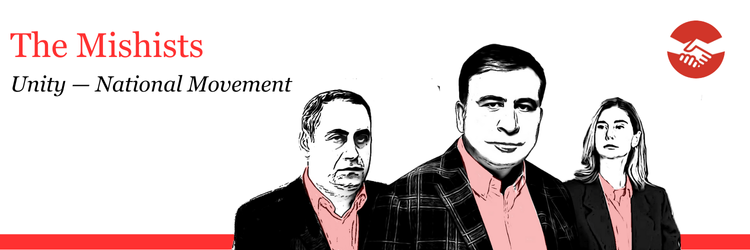
Unity — National Movement is the electoral vehicle for the UNM and its jailed leader and former president — Mikheil (Misha) Saakashvili. This election they will be joined by Strategy Aghmashenebeli and several smaller groups that have previously allied with the party.
Since its inception last summer, Unity — National Movement has campaigned on economic issues and corruption.
Like other pro-Western groups, they have strongly criticised the ruling party’s deteriorating relations with the EU and US, vowing to reverse Georgia’s ‘Putinisation under oligarch Ivanishvili’.
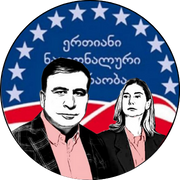 The United National Movement (UNM)
The United National Movement (UNM)
Georgia’s ruling party under President Mikheil Saakashvili from the 2003 Rose Revolution to their ousting in 2012.
Despite placing second after Georgian Dream in almost every national election since, the party also receives consistently high negative ratings in polls, with many ruling out ever supporting them.
As a result, much of the opposition has distanced themselves from the toxic legacy of the party’s latter years in power.
Amidst the backdrop of party founder Mikheil Saakasvili’s departure, dramatic return, and subsequent imprisonment in Georgia, the UNM have faced challenges in maintaining a stable leadership. Not long after announcing their latest electoral alliance in July last year, the party again appointed a new chair, replacing Levan Khabeishvili with Tina Bokuchava.
The party maintains an unwavering loyalty to Saakashvili. Despite being incarcerated, and hospitalised as an inmate for the past 25 months, they last year floated the idea of putting forward his candidacy for the position of prime minister.
Strengths: A legacy party; a stable Saakashvili following.
Weaknesses: A lack of clear language to address abuses of power during their rule. A failure to foster a new leader that would not look small compared to the party’s founder.
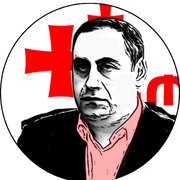 Strategy Aghmashenebeli
Strategy Aghmashenebeli
Strategy Aghmashenebeli is led by Giorgi Vashadze, an energetic former UNM official who insists he knows how to move the country to the West. The group is the UNM’s most electorally significant ally. Strategy Aghmashenebeli has participated in UNM-led electoral coalitions in almost every national election since splitting from it in 2016.
Strengths: Vashadze’s track record of spearheading public service reforms during the UNM’s rule.
Weaknesses: An inability to position themselves as a party with ambitions larger than the UNM.
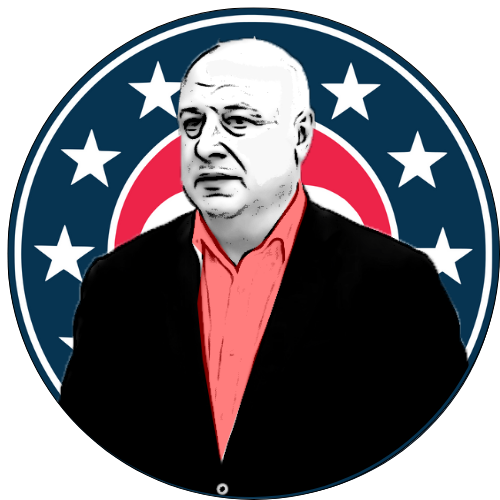 European Georgia
European Georgia
In 2017, European Georgia deprived the UNM of a majority of their MPs by splitting from the party and positioning themselves as a de facto UNM without the cult of Saakashvili’s personality. It included most of the party’s top leadership, including figures such as Giga Bokeria, Davit Bakradze, Sergi Kapanadze, and Gigi Ugulava.
Despite this, the party struggled to win over UNM voters, obtaining less than 6% in the 2020 parliamentary elections.
Their lack of success combined with internal strife left the party with Bokeria and his wife and Tabula media group founder Tamar Chergoleishvili as the only visible figures by early 2024.
In early August, as the party failed to find a place in the growing opposition groupings, Bokeria and Chergoleishvili appear to have been forced out, only for the party to come full circle and return to the UNM’s embrace.
Strengths: The party’s new leader, Gigi Tsereteli, is a seasoned political operator.
Weaknesses: All the other prominent leaders have departed the party since 2018.
The alliance formed by the Ahali party in March appears to have become a platform for a new generation of leaders who took their first political steps in the shadow of Mikheil Saakashvili’s leadership, but have grown more ambitious in his absence from both power and the country. The Coalition has four more or less equally popular leaders instead of just one — formal or informal.
In August, the Coalition was also joined by a fifth, the Republican Party, a group established before Georgia regained independence from the Soviet Union, with a history of aligning itself with both the UNM and Georgian Dream.
Following Nika Gvaramia’s unexpected announcement that he would not be included in the party’s electoral list, the Coalition unveiled Nana Malashkhia, the iconic ‘woman with the EU flag’ protester, as their top candidate.
 Ahali
Ahali
Ahali, (pronounced akhali), means ‘new’ in Georgian. It is led by the duo of Nika Melia and Nika Gvaramia.
Melia departed from the UNM in December, not long after being ousted as party chair for an apparent lack of loyalty to Saakashvili.
Gvaramia previously served as an official during the UNM’s rule. Notably, he has also led TV stations affiliated with the UNM during Georgian Dream’s rule: Rustavi 2 and then Mtavari Arkhi.
Ahali aims to draw support from new UNM voters who may not align as strongly with the leadership of UNM’s founder, imprisoned former president Mikheil Saakashvili.
Strengths: Both leaders presumably bring a significant base of urban liberal voters to the newly formed party, likely drawing many supporters away from the UNM. Due to the weak brand recognition of their new creation, an unintended advantage is that less informed voters might mistakenly believe they are voting for the UNM and Misha by selecting four, the Coalition for Change, on the ballot.
Weaknesses: The duo hasn’t had time to stand the test of time, and initially radiated an awkward chemistry that raises concerns about party leadership stability.
 Droa!
Droa!
Headed by Elene Khoshtaria, another former UNM official who went on to form her own party in early 2021, after being alienated by the UNM spin-off European Georgia.
Droa!, which means ‘it’s time!’ in Georgian, has strong anti-Russian positions and could be attractive to urban liberal voters.
Strengths: Khoshtaria has built a political brand focused on reducing toxicity by avoiding personal attacks on other opposition groups and figures, something some liberal voters wary of opposition infighting may find attractive.
Weaknesses: Like other UNM spin-off groups, Droa! have struggled to grow big enough to run independently.
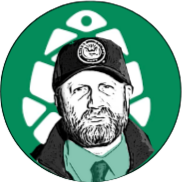 Girchi — More Freedom
Girchi — More Freedom
Zurab Girchi Japaridze emerged as the undisputed libertarian leader of his own separate party after a rift with other leaders in the original Girchi party in late 2020.
Japaridze’s group was the first to break away from the UNM in 2016. The former UNM official and MP has began wearing a tie less frequently since, becoming social media savvy and attracting a relatively stable base of young voters through unconventional political theatrics and advocacy for drug liberalisation.
Strengths: Employs an informal and unconventional communication style that sometimes includes humour and anger with unfiltered language, giving them an edge in reaching out to young people more effectively than other liberal parties.
Weaknesses: Their libertarian positions and statements often frustrate liberal voters who prioritise equality issues and proactive measures against discrimination.
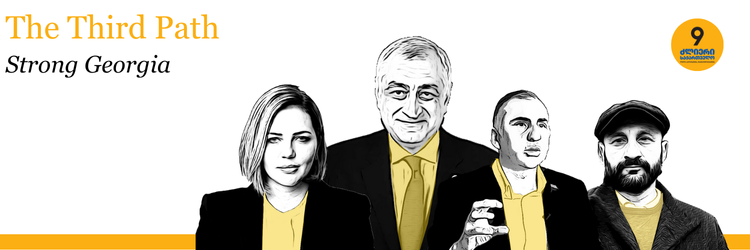
Unlike the Coalition for Change, which seems to be led by four equals, it’s widely understood that Mamuka Khazaradze, the chair of Lelo, is the strongest leader in the Strong Georgia alliance, even if this isn’t explicitly acknowledged. Otherwise, the alliance is presented as a cooperation between four leaders — Khazaradze, Anna Dolidze, Aleko Elisashvili, and Levan Tsutskiridze, a unity that faced a challenge during the recent failure to ally with Giorgi Gakharia’s For Georgia party, as the idea was not universally accepted.
Strong Georgia is expected to appeal to voters disillusioned with both Saakashvili-influenced groups and the ruling Georgian Dream party.
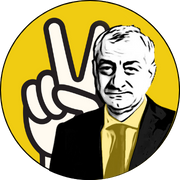 Lelo for Georgia
Lelo for Georgia
Lelo for Georgia, led by former bankers Mamuka Khazaradze and Badri Japaridze, have moulded their image as a new centre of gravity for pro-Western and liberal voters who have a distaste for Saakashvili and the UNM.
Strengths: Their leaders’ image of being financially competent and well-connected to help the economy through international investments; a self-crafted image of offering an alternative beyond the UNM versus Georgian Dream dichotomy and resulting polarisation.
Weakness: Despite their prominent public profile, the leaders’ silence on acute political developments in the country before 2019; the party leaders have been repeatedly hit by accusations of predatory bank loan policies and associated evictions.
 For the People
For the People
Anna Dolidze, a former deputy defence minister under Georgian Dream, has a background as a human rights defender and has been critical of both the United National Movement (UNM) and Georgian Dream-led governments. She founded the For the People party in mid-2021, focusing on issues like judicial reforms, money in politics, and the disappearance of public spaces.
Strengths: Dolidze’s criticism of both major political parties make her relatively immune to the typical accusation against all Georgian Dream critics: that she’s allied with the UNM.
Weaknesses: Similar to the Labour Party, Dolidze’s group is part of Georgia’s left-wing political spectrum which has struggled to grow.
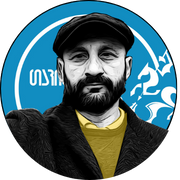 Freedom Square
Freedom Square
Freedom Square is the creation of Levan Tsutskiridze, former head of the Eastern European Centre for Multiparty Democracy. Tsutskiridze exemplifies a shift from civil society, which has faced increasing government pressure, to active politics.
After serving as one of the leaders of anti-government protests against the foreign agent law, he launched Freedom Square in July, aiming to mobilise other leaders like himself — those without prior political experience — to step into the political arena.
Strengths: The group is mainly composed of policy experts without toxic political baggage, which could make some of its members a suitable fit for a hypothetical government cabinet made up of non-affiliated ‘professionals’.
Weaknesses: The group, which formed just shortly before joining the alliance, has limited recognition among the public.
 Citizens
Citizens
If you’re searching for Georgian anger personified, look no further than Aleko Elisashvili. The former journalist and urban activist is renowned for his fiery speeches and plain-spoken approach.
Elisashvili made a significant impact by finishing as the runner-up in the Tbilisi mayoral race seven years ago, surpassing the UNM’s candidate. However, he struggled to capitalise on this success and only launched his own party in 2020.
He also gained popularity from some quarters for punching Georgian Dream’s parliamentary leader, Mamuka Mdinaradze, in the face during hearings of the foreign agent law.
Strengths: Elisashvili.
Weaknesses: Elisashvili.
Their coalition is a clear example of a marriage of convenience, as its core constituent groups — the Alliance of Patriots and the Conservative Movement, commonly known as Alt Info — never strongly suggested uniting until Alt Info’s party was deregistered.
Aside from the announcement of their joining together, which later appeared in TV campaign ads, the two groups have rarely offered the optics of unity in their campaigns, while still asking voters to support their alliance.
Despite winning four seats in the previous elections, the Alliance of Patriots has since disengaged from parliamentary life and, despite their promises, have struggled to make a comeback. While they rarely share the stage, along with Alt Info they share the sentiment that Georgian Dream’s conservatism is insincere and unreliable.
Strengths: Their leader, a seasoned anti-liberal campaigner and prominent journalist, Irma Inashvili.
Weaknesses: The party’s voter base has predominantly been older and may struggle to regain supporters who have shifted to Alt Info; the party may criticise Georgian Dream extensively, but they might also appear too aligned with the government.
 Alt Info
Alt Info
The primary vote-getter for the alliance is anticipated to be the Conservative Movement, a pro-Russian extremist group more commonly known as Alt Info. Having outshone other far-right groups in recent years, they now assert their mission to prevent Georgian Dream from hijacking the strong conservative and anti-Western positions they have championed.
Months before the elections, the authorities deregistered the Conservative Movement, fueling speculation that the informal alliance between Alt Info and Georgian Dream might have ended.
Strengths: Georgian Dream has partially, and only recently, adopted Alt Info’s rhetoric on sovereignty and resisting Western pressure, which allows Alt Info to claim authenticity and coherence. Unlimited TV air through their own station.
Weaknesses: A proclivity for political violence and strong language that may scare off some voters with strong conservative beliefs; unstable leadership; frequent clampdowns by Facebook.
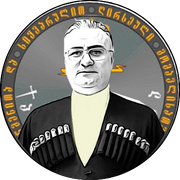 Georgian Idea
Georgian Idea
A lesser-known party that was created and is currently led by Levan Chachua, who was imprisoned in 2010 for storming a private TV station where a controversial book was being discussed.
After the Georgian Dream government released Chachua as a political prisoner in 2013, he became involved in campaigns to limit the rights of queer people, women, and children.
Strengths: Consistency.
Weaknesses: Low visibility; apparent lack of financial resources; the party is prone to endorse stronger far-right leaders instead of fostering one.
 Gakharia’s For Georgia
Gakharia’s For Georgia
For Georgia remains optimistic not only about surpassing the 5% threshold independently in the upcoming elections, but also denying Georgian Dream or the UNM-led formations a chance to form a coalition government.
Many experts believe that the party founded and chaired by former Georgian Prime Minister Giorgi Gakharia, unlike other liberal groupings, can get substantial support from public employees who may be concerned about the ruling party’s increasingly anti-Western and authoritarian positions.
Strengths: The inertia of Gakharia’s cult of personality fostered during his premiership in 2019–2021; could be more attractive to public employees, moderates, and older voters.
Weaknesses: May struggle to expand and steal voters from liberal parties, many of whom still hold a grudge over his crackdown on anti-government protests in 2018-2019 while some fear that Gakharia could be a side project from Ivanishvili, or that they may reconcile if the opportunity arises.
 Girchi
Girchi
After the 2020 parliamentary elections and a separate child pornography dispute that led to a split, the libertarian Girchi party continued without their firebrand leader, Zurab Girchi Japaridze, largely relying on their parliamentary representation with four seats.
During their parliamentary tenure, Girchi has focused on maintaining their mock religious organisation to help Georgian conscripts avoid military service and has recently advocated for a mass amnesty of prisoners, an idea the ruling party has appropriated ahead of the elections.
Another Girchi proposal that Georgian Dream endorsed and fast-tracked through parliament was their initiative to abolish mandatory gender quotas. This move, for some liberal voters, has earned Girchi a reputation as a group contributing to Georgian Dream’s anti-European steps.
Strengths: Ability to be pragmatic in cooperating with other groups, with less emphasis on personalised politics. Ideological consistency.
Weaknesses: Occasional cooperation with the Georgian Dream parliamentary majority has led to accusations of collusion with the ruling party.
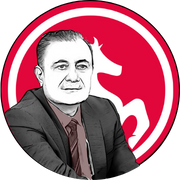 Labour Party
Labour Party
Over the years, Labour have maintained a stable voter base but has struggled to grow. The party is unlikely to surpass the electoral threshold alone.
Strengths: Devotion to articulating social and economic grievances.
Weaknesses: Inability to change leadership since its inception 29 years ago; harsh and, at times, conflict-prone statements by the party chair, Shalva Natelashvili.
Two months after the crucial parliamentary vote, Georgia will appoint a new president through an electoral college comprising of all 150 MPs as well as 150 representatives selected by local government bodies.
These changes, which would further limit presidential powers, and Zourabichvili’s increased public approval, may prompt the president to consider making a bid for the prime ministerial position instead, assuming the opposition secures enough votes to form a coalition government. However, so far, she has mostly floated the idea of re-running for a second term as president.
While previously being one of the most unpopular Georgian political leaders, Zourabichvili recently used her unique position to become the only governmental institution to counter the ruling party’s anti-Western steps. This has propelled her to become one of the most popular politicians in Georgia, possibly among many first-time, Gen Z voters.
Her latest initiative is the Georgian Charter, which all key pro-Western political groups in Georgia have signed. The Charter outlines the hypothetical opposition-led coalition government’s commitment to swiftly reversing legislative changes that have obstructed the country’s EU accession.
Additionally, the parties that have signed the charter have promised to give Zourabichvili the informal authority to nominate members of the next government cabinet, further growing expectations that she has no plans to retire politics despite not belonging to any political party.
Strengths: Her track record in the pro-democracy movement during Saakashvili’s presidency renders her relatively immune to the government’s conspiracy theories, that suggest almost all their critics and rivals, including her, are in cahoots with the UNM.
Weaknesses: Like Gakharia, Zourabichvili’s history of close allyship with Ivanishvili causes concern among some of the anti-government voters that the president may soon need; As a presidential candidate in 2018, she took one of the most unpopular and controversial positions by accusing Saakashvili’s government of waging a war against South Ossetians in 2008.
Illustrations by Tamar Shvelidze/OC Media.
